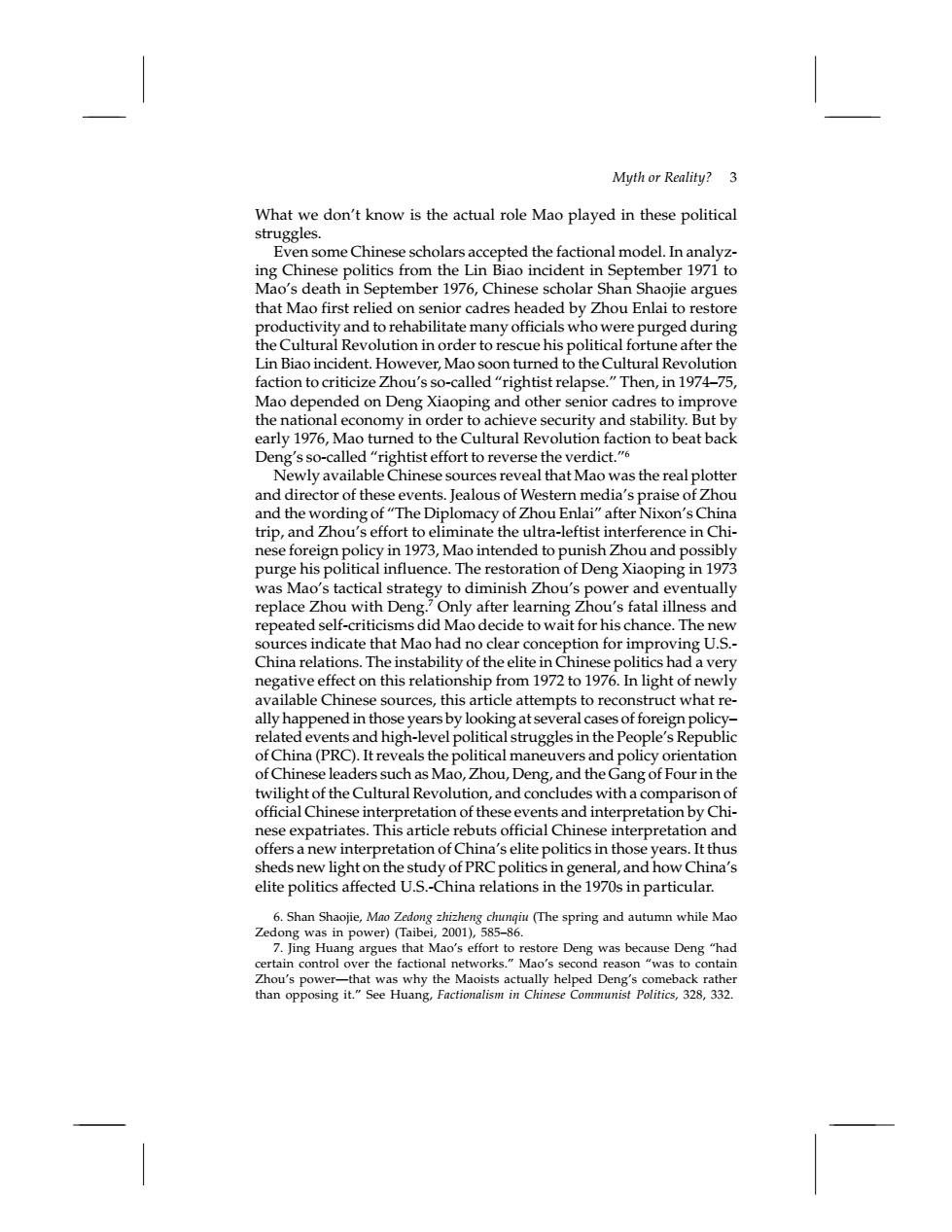正在加载图片...

Myth or Reality?.3 What we don't know is the actual role Mao played in these political struggles Even some Chinese scholars accepted the factional model.In analyz- ing Chinese politics from the Lin Biao incident in September 1971 to Mao's death in September 1976,Chinese scholar Shan Shaojie argues that Mao first relied on senior cadres headed by Zhou Enlai to restore productivity and to rehabilitate many officials who were purged during the Cultural Revolution in order to rescue his political fortune after the Lin Biao incident.However,Mao soon turned to the Cultural Revolution faction to criticize Zhou's so-called "rightist relapse."Then,in 1974-75, Mao depended on Deng Xiaoping and other senior cadres to improve the national economy in order to achieve security and stability.But by early 1976,Mao turned to the Cultural Revolution faction to beat back Deng's so-called "rightist effort to reverse the verdict."6 Newly available Chinese sources reveal that Mao was the real plotter and director of these events.Jealous of Western media's praise of Zhou and the wording of "The Diplomacy of Zhou Enlai"after Nixon's China trip,and Zhou's effort to eliminate the ultra-leftist interference in Chi- nese foreign policy in 1973,Mao intended to punish Zhou and possibly purge his political influence.The restoration of Deng Xiaoping in 1973 was Mao's tactical strategy to diminish Zhou's power and eventually replace Zhou with Deng.?Only after learning Zhou's fatal illness and repeated self-criticisms did Mao decide to wait for his chance.The new sources indicate that Mao had no clear conception for improving U.S.- China relations.The instability of the elite in Chinese politics had a very negative effect on this relationship from 1972 to 1976.In light of newly available Chinese sources,this article attempts to reconstruct what re- ally happened in those years by looking at several cases of foreign policy- related events and high-level political struggles in the People's Republic of China(PRC).It reveals the political maneuvers and policy orientation of Chinese leaders such as Mao,Zhou,Deng,and the Gang of Four in the twilight of the Cultural Revolution,and concludes with a comparison of official Chinese interpretation of these events and interpretation by Chi- nese expatriates.This article rebuts official Chinese interpretation and offers a new interpretation of China's elite politics in those years.It thus sheds new light on the study of PRC politics in general,and how China's elite politics affected U.S.-China relations in the 1970s in particular. 6.Shan Shaojie,Mao Zedong zhizheng chungiu (The spring and autumn while Mao Zedong was in power)(Taibei,2001),585-86. 7.Jing Huang argues that Mao's effort to restore Deng was because Deng "had certain control over the factional networks."Mao's second reason "was to contain Zhou's power-that was why the Maoists actually helped Deng's comeback rather than opposing it."See Huang,Factionalism in Chinese Communist Politics,328,332.Myth or Reality? 3 What we don’t know is the actual role Mao played in these political struggles. Even some Chinese scholars accepted the factional model. In analyzing Chinese politics from the Lin Biao incident in September 1971 to Mao’s death in September 1976, Chinese scholar Shan Shaojie argues that Mao first relied on senior cadres headed by Zhou Enlai to restore productivity and to rehabilitate many officials who were purged during the Cultural Revolution in order to rescue his political fortune after the Lin Biao incident. However, Mao soon turned to the Cultural Revolution faction to criticize Zhou’s so-called “rightist relapse.” Then, in 1974–75, Mao depended on Deng Xiaoping and other senior cadres to improve the national economy in order to achieve security and stability. But by early 1976, Mao turned to the Cultural Revolution faction to beat back Deng’s so-called “rightist effort to reverse the verdict.”6 Newly available Chinese sources reveal that Mao was the real plotter and director of these events. Jealous of Western media’s praise of Zhou and the wording of “The Diplomacy of Zhou Enlai” after Nixon’s China trip, and Zhou’s effort to eliminate the ultra-leftist interference in Chinese foreign policy in 1973, Mao intended to punish Zhou and possibly purge his political influence. The restoration of Deng Xiaoping in 1973 was Mao’s tactical strategy to diminish Zhou’s power and eventually replace Zhou with Deng.7 Only after learning Zhou’s fatal illness and repeated self-criticisms did Mao decide to wait for his chance. The new sources indicate that Mao had no clear conception for improving U.S.- China relations. The instability of the elite in Chinese politics had a very negative effect on this relationship from 1972 to 1976. In light of newly available Chinese sources, this article attempts to reconstruct what really happened in those years by looking at several cases of foreign policy– related events and high-level political struggles in the People’s Republic of China (PRC). It reveals the political maneuvers and policy orientation of Chinese leaders such as Mao, Zhou, Deng, and the Gang of Four in the twilight of the Cultural Revolution, and concludes with a comparison of official Chinese interpretation of these events and interpretation by Chinese expatriates. This article rebuts official Chinese interpretation and offers a new interpretation of China’s elite politics in those years. It thus sheds new light on the study of PRC politics in general, and how China’s elite politics affected U.S.-China relations in the 1970s in particular. 6. Shan Shaojie, Mao Zedong zhizheng chunqiu (The spring and autumn while Mao Zedong was in power) (Taibei, 2001), 585–86. 7. Jing Huang argues that Mao’s effort to restore Deng was because Deng “had certain control over the factional networks.” Mao’s second reason “was to contain Zhou’s power—that was why the Maoists actually helped Deng’s comeback rather than opposing it.” See Huang, Factionalism in Chinese Communist Politics, 328, 332